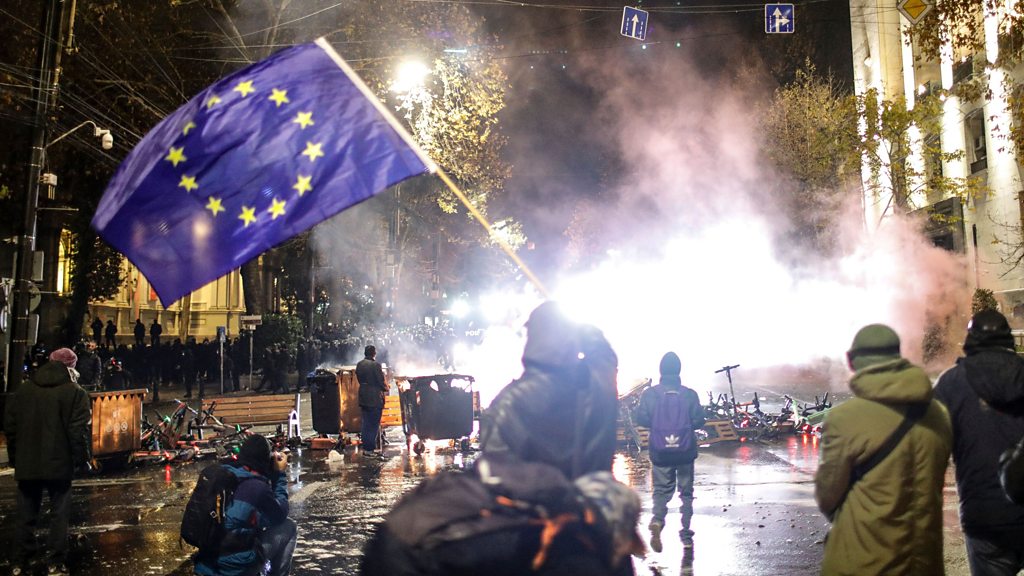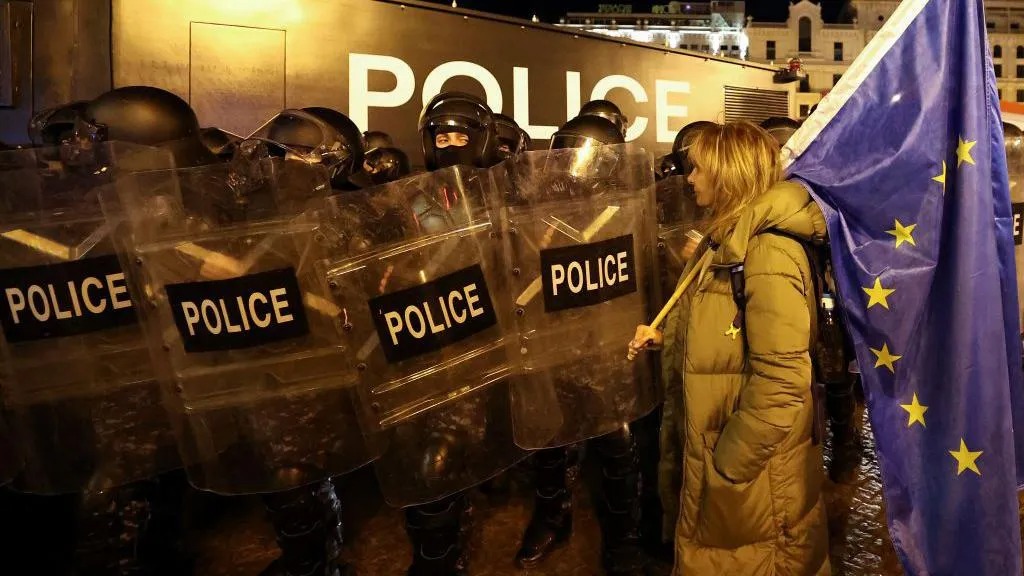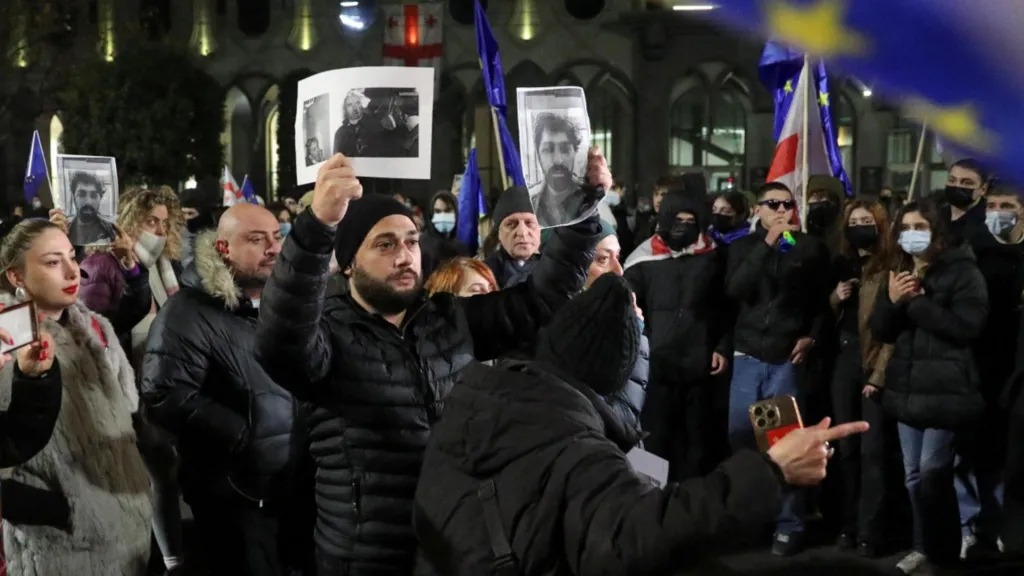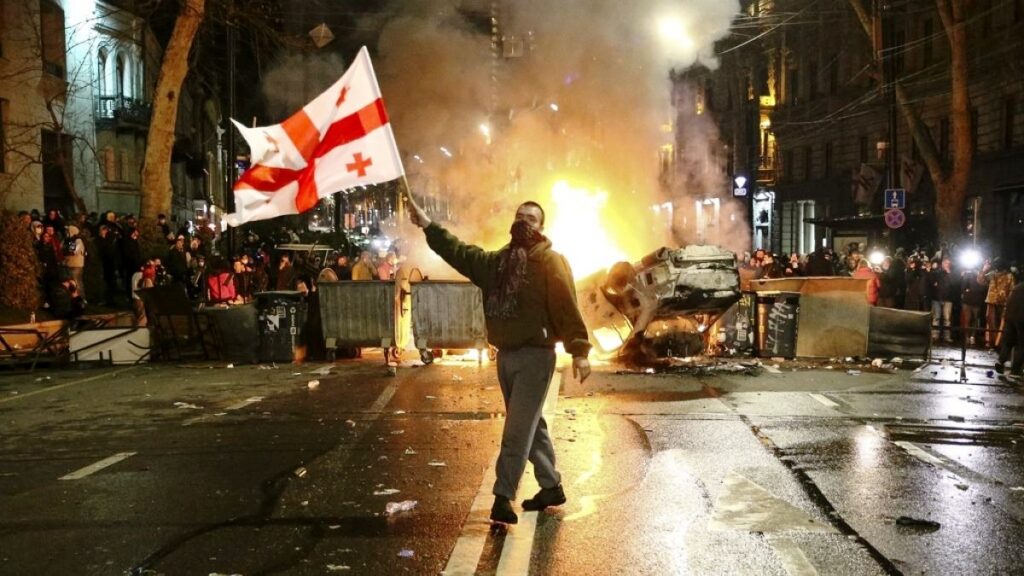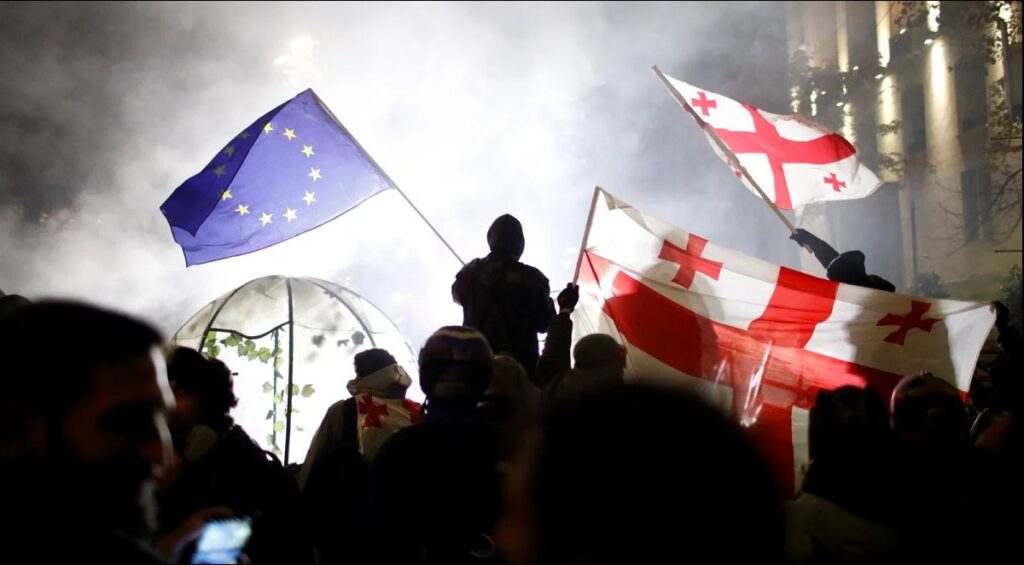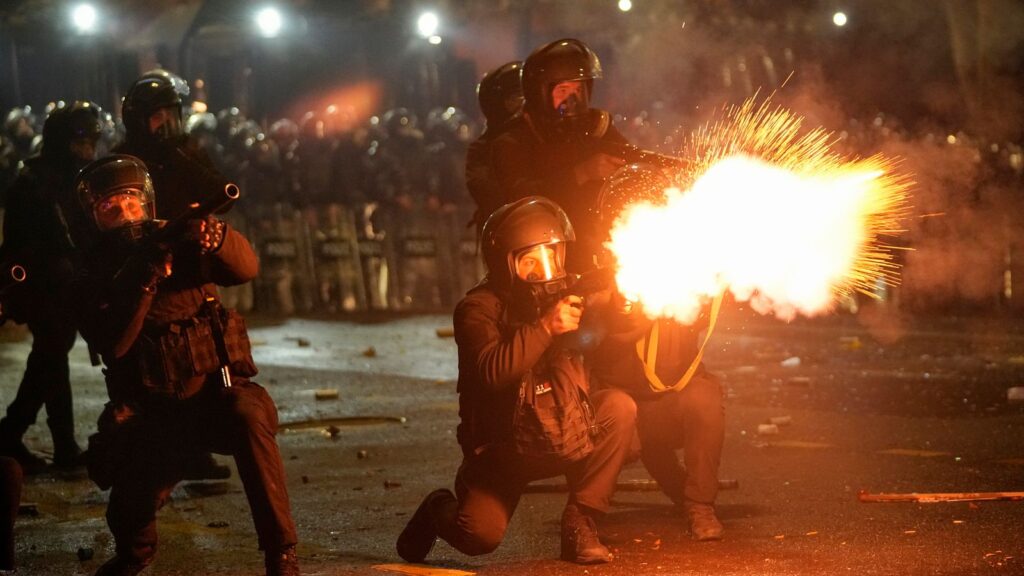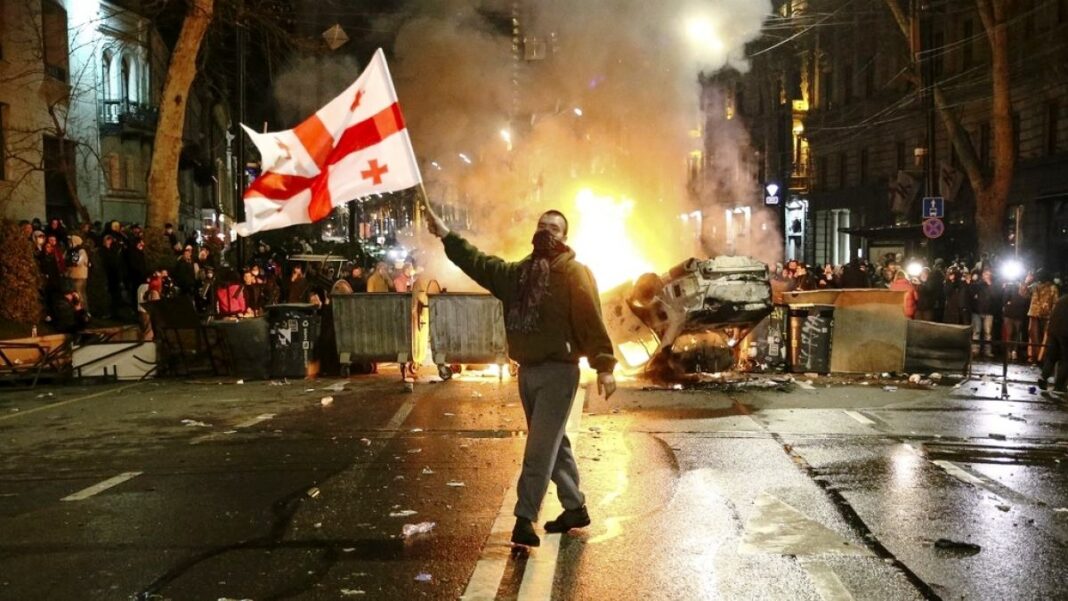Protests once again engulf Tbilisi and other cities across Georgia. Citizens from all walks of life have taken to the streets, driven by a deep frustration with their government’s policies and perceived retreat from Europe. Prime Minister Irakli Kobakhidze’s announcement on November 28 that Georgia would suspend negotiations with the European Union until 2028 sparked this nationwide outrage.
This decision, following controversial parliamentary elections on October 26, has ignited fears that Georgia is drifting away from its European aspirations and edging closer to Russia. For many, this is a political disagreement and a fundamental clash over the country’s identity and future direction.
The reason for such a statement by the Prime Minister was European criticism regarding the parliamentary elections held on October 26 (which both opposing sides referred to as a kind of referendum). According to officials, these elections gave the Georgian Dream a new mandate, while protesters (and naturally the opposition) claim they were unfair.
One month after the elections, the street demand is – new elections!
The only grievance of the people who have taken to the streets, people of various ages and professions, is the anti-European direction and a return to Russia. Their outrage and demands stem from this.
Fortuna spoke with protest participants:
The protests, however, have not been entirely peaceful. Although no fatalities have been reported, numerous individuals have sustained injuries; some required surgical intervention, while others were beaten by law enforcement. Even individuals who were far from the epicenter of the demonstrations found themselves affected by the actions of law enforcement, including the use of batons.
The use of force during the dispersals has only fueled the momentum of the protests, increasing the number of participants in the following days. As is often the case in such situations, the authorities have claimed that the protesters violated legal boundaries and that law enforcement responded in accordance with the law and European standards. Additionally, officials reported that dozens of law enforcement officers were injured during the events.
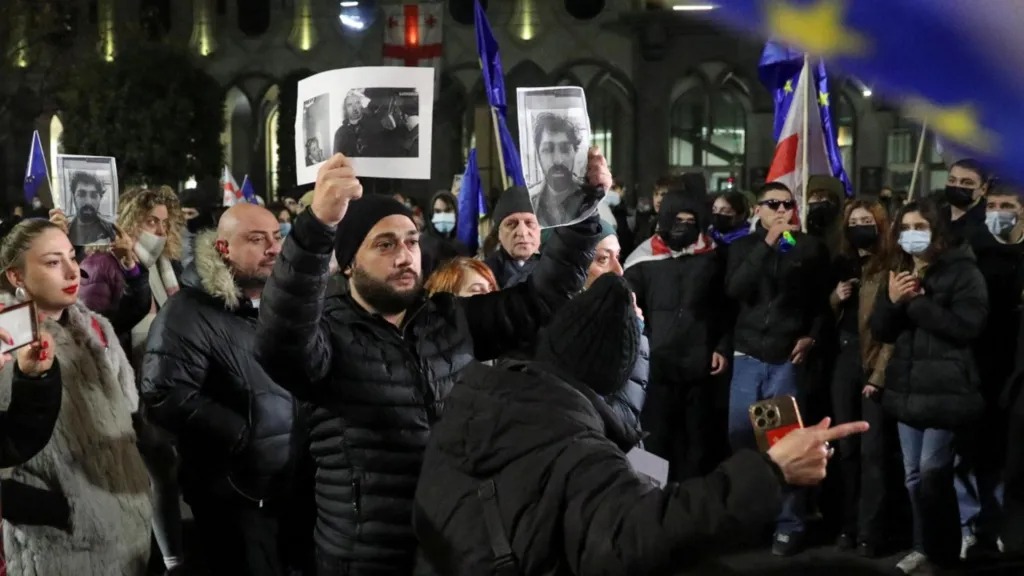
Masks Are Off
What dynamics are we witnessing? Why did the authorities feel compelled to make such a provocative statement when public outrage over the “rigged” elections had not yet subsided?
This stance immediately energized anti-government forces and voters, reinforcing their argument that “now everything is clear.” European leaders echoed this sentiment, whose statements and calls for action amplified the criticism. One after another, European anti-government declarations, appeals, and evaluations poured in, many demanding an investigation into the election results.
In this climate, supporters of Georgia’s European trajectory have grown increasingly anxious, fearing that the EU might distance itself from Georgia, further intensifying the protests.
Joe Wilson, Chairman of the US Helsinki Commission, issued a sharp statement regarding the situation in Georgia:
“The de facto government of Georgia has abandoned any pretense of democracy and is now arresting innocent activists and peaceful members of the opposition in their homes and workplaces. Make no mistake, Georgian Dream is employing Kremlin-style dictatorial tactics,” said the Republican Congressman.
Estonia’s Foreign Minister Margus Tsahkna added:
“The masks are already off for everyone on the international stage, but first and foremost in front of the Georgian people.”
The Secretary-General of the Council of Europe also engaged directly, holding discussions with Salome Zourabichvili and Irakli Kobakhidze, and announced plans to visit Georgia in the near future. According to reports, Alain Berset emphasized the need to investigate cases of excessive force used by law enforcement during the demonstrations. He also expressed the Council of Europe’s deep concern over the country’s increasing polarization and political stalemate.
In response to the backlash, the government-backed backtrack slightly. The next day, Irakli Kobakhidze stated that his previous remarks needed to be understood. In his clarification, he also referenced the EU Ambassador, Pawel Herczynski, in an attempt to defuse tensions.
Action Instead of Blackmail
The government has voiced frustration with Europe. “We have maintained peace and achieved the highest economic growth, yet we are still met with blackmail and no congratulations,” lamented Prime Minister Irakli Kobakhidze.
Despite mounting criticism, the government insists that it is not deviating from its pro-European course. On the contrary, officials claim they are committed to redoubling their efforts to achieve their goals of European integration.
Prime Minister Kobakhidze reiterated this commitment, stating:
“Put the negotiations on the table today, and we will sign immediately. I firmly believe that success lies in perseverance. We will fight, uphold our dignity, and move forward toward European integration at an even faster pace.
We promise to spare no effort to secure Georgia’s full membership in the European Union by 2030. This is our responsibility to every Georgian citizen, particularly the 1,120,000 voters who endorsed our vision and slogan, ‘Towards Europe with Peace, Dignity, and Prosperity.’
Our primary foreign policy priority is EU integration. Action, not blackmail, must be the foundation of Georgia’s full-fledged integration into the European Union.
Once again, we assure the Georgian public, which placed strong trust in us during the parliamentary elections on October 26, that peace and stability in Georgia will remain unshaken. Despite artificial obstacles, Georgia will resolutely continue its journey toward European integration.
Let me remind the European Union: “Put the negotiations on the table, and we will sign them today. Action, not blackmail!”
Following this statement, the Prime Minister held another briefing, firmly declaring that a revolution in Georgia was impossible and that the so-called “Nats-Maidan” would not take place.
Fortuna spoke with political analyst Nika Chitadze, who provided his perspective on the current situation:
“The international community has tolerated Bidzina Ivanishvili and the Georgian Dream party for an extended period because they claimed their primary focus was European integration. However, it has been evident from the beginning that the government has been engaging in a pro-Russian strategy under the guise of European aspirations.
Now, Kobakhidze appears to be attempting to buy time. Why were they issuing threats before the elections instead of showing readiness for dialogue? Before the polls, they explicitly stated that opposition representatives should face prosecution, and they intimidated voters who supported the opposition. How could such an environment foster genuine discussions? Now, they are advocating for dialogue because it has become clear that the protests have gained significant momentum and spread across multiple cities in Georgia.
When they say, ‘We will sign,’ they shift the blame onto the EU. This is analogous to Russia blaming Georgia and saying, ‘You severed ties with us, not the other way around.’ It’s the same pattern. In this case, the attack serves as a form of defense.”
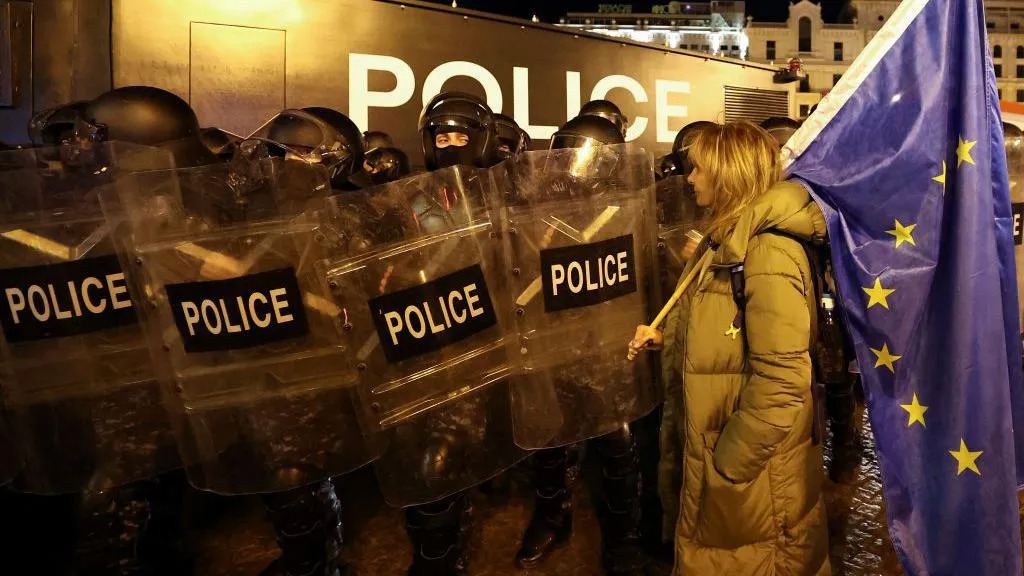
What Will a Reset Entail?
What is the root of the issue? If both sides—Europe and the Georgian government—claim to share the same goals, why has the relationship grown so strained? Where does the real problem lie?
Is this an attempted revolution, or are we witnessing the genuine protest of sincere citizens? The crux of the discord lies precisely here.
The Georgian government has indirectly suggested that the deterioration in relations began after the war in Ukraine. Officials have hinted that Georgia faced pressure to open a so-called “second front” against Russia, and their refusal led to a cooling of ties. This tension was further exacerbated by unfriendly statements from government circles in Georgia, along with veiled reproaches aimed at Europe, which ultimately unsettled diplomatic relations.
Prime Minister Irakli Kobakhidze has repeatedly expressed optimism that relations will “reset” and stabilize once the war in Ukraine ends. However, the question remains: how realistic is this scenario, especially given the risk that the rift between the two sides could deepen further in the meantime?
Fortuna sought insight from political commentator Buka Petriashvili, who offered a critical perspective:
“A reset with the European Union and the democratic world—our country’s strategic partners—will only occur if Ivanishvili’s government reverses its laws, halts the erosion of democracy, and ceases human rights violations. Unfortunately, there is no indication of this happening. As Ivanishvili envisioned, a reset is unlikely to materialize because Washington, Brussels, and other European capitals have fundamentally different views on what returning to normal relations entails.
Georgian Dream has substituted meaningful action with rhetoric and word games. A genuine reset can only happen if Ivanishvili assumes responsibility for initiating early elections, repealing controversial laws, and releasing those detained during the protests.”
This highlights a critical divergence: while the Georgian government may hope for a thaw in relations, international partners appear to demand substantial reforms as a prerequisite for progress.
The Solution: What Will Happen?
The Georgian government appears to be pinning its hopes on the United States—specifically, on its new administration and the possibility of a shift in policy. Following Donald Trump’s inauguration, Georgian Dream anticipates a relationship reset, which, if successful, could provide the government with a significant strategic advantage. However, the uncertainty of this outcome looms large. During a briefing, when asked by a journalist from an opposition TV channel, “What if this doesn’t happen?” Prime Minister Irakli Kobakhidze responded dismissively, “That’s your dream, and it won’t come true.”
Setting aside the rhetoric, a critical question emerges: Does the Georgian government have a Plan B? What if its relations with the new US administration do not progress as hoped? What if the US chooses to maintain its distance, refrain from deep involvement, or prioritize diplomacy without directly opposing Europe’s stance toward Georgia? In such a scenario, could the government face complete international isolation?
If this were to happen, Europe would likely refuse to recognize the Georgian Dream’s legitimacy. Conversely, consider the opposite outcome: suppose the government successfully secures favorable relations with the US. What would Europe’s response be? Would it resume cooperation with Georgia, particularly given that the EU has not fully closed its doors? As European Commission President Ursula von der Leyen stated, Georgia’s European future is not entirely off the table.
Expert Perspectives
Political commentator Buka Petriashvili shared his analysis of the situation:
“When Donald Trump takes office on January 20, one of the key issues on his agenda will undoubtedly be Ukraine. Viewing Georgia within the broader context of Ukraine is both logical and prudent. However, the simplistic narrative promoted by the Georgian Dream—that Trump will end the war and everything will fall into place for us—is naive and unrealistic. Georgia is not a priority for Trump, but it could become a critical factor in his dealings with Russia, allowing him to assert his strength as a defender of democracy.
The role of the US will undoubtedly be significant, and there is a possibility of coordination between the US and the EU regarding Georgia. However, Trump may still need to align fully with the EU, particularly in implementing sanctions. Nor does it mean that if Trump adopts a favorable stance toward Ivanishvili (which I find unlikely), the EU will automatically reverse its initial positions and recognize Georgian Dream’s legitimacy.”
Political analyst Nika Chitadze emphasized the importance of constructive dialogue:
“Dialogue is essential to achieve specific results but must be backed by meaningful pressure, including sanctions. The government must be compelled to come to the negotiating table with explicit preconditions: ensuring repeat elections, fostering political pluralism, and guaranteeing equality during the pre-election process.
At the same time, if the ruling party loses, it must be provided with security guarantees. They should not fear retribution. Compromise is crucial, just as during Eduard Shevardnadze’s time in 2003. This is the only way to find a sustainable solution.
Reconciliation is necessary in the long term. We are all citizens of the same country and share common challenges. However, we must first resolve the current impasse before achieving reconciliation.”
A Precarious Tightrope
In the meantime, Georgia continues to move forward, albeit with growing polarization—within political circles and throughout society. The war between Russia and the rest of the civilized world rages on, casting a long shadow over the region. All eyes are on the United States, with many waiting to see its rhetoric and concrete actions. At the same time, pressing economic issues, such as Chinese expansion and internal European challenges, remain highly relevant.
Once again, Georgia is walking a tightrope—a familiar path in its recent history. On one side lies Russia, a looming presence; on the other, the much-anticipated promise of Europe. The stakes have never been higher, and Georgia’s future hangs in the balance.
